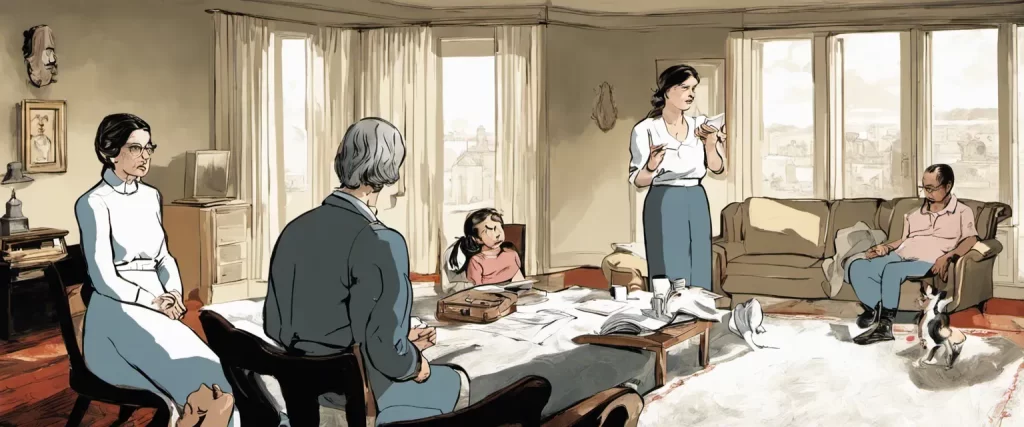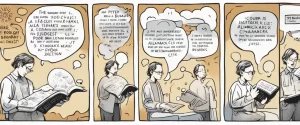——Toxic Parents by Susan Forward & The Family Crucible by Dr. Augustus Y. Napier
Family dynamics and relationships play a crucial role in shaping individuals’ lives, molding their beliefs, values, and behaviors. However, not all families are equal in their ability to foster a healthy and nurturing environment. Unfortunately, many individuals find themselves navigating through the complex realm of dysfunctional family structures, struggling to break free from the toxic patterns that impede personal growth and emotional well-being.
In the realm of understanding and addressing family dysfunction, two influential books stand out: “Toxic Parents” by Susan Forward and “The Family Crucible” by Dr. Augustus Y. Napier. Both works delve into the intricate complexities of family relationships, shedding light on the struggles faced by individuals ensnared in toxic family dynamics. Although written from distinct perspectives, these groundbreaking texts offer valuable insights into the effects of toxic familial influences and explore potential pathways towards healing and growth.
Purpose:
The purpose of this comparative study is to critically examine the key concepts, strategies, and therapeutic insights presented in “Toxic Parents” and “The Family Crucible.” By analyzing the unique perspectives of Susan Forward and Dr. Augustus Y. Napier, we seek to gain a comprehensive understanding of the underlying causes and consequences of family dysfunction, as well as the suggested paths towards healing and transformation.
Scope and Methodology:
This study will primarily focus on the thematic analysis of “Toxic Parents” and “The Family Crucible,” examining how each book unpacks the nature of dysfunctional family dynamics and the subsequent impact on individuals’ lives. Furthermore, particular attention will be given to the authors’ therapeutic approaches, highlighting their suggested strategies for breaking free from the destructive cycles of toxicity within familial relationships.
Key Questions:
1. What are the main themes explored in “Toxic Parents” and “The Family Crucible” regarding family dysfunction?
2. How do Susan Forward and Dr. Augustus Y. Napier conceptualize the root causes of toxic family dynamics?
3. What therapeutic strategies and interventions do the authors propose for individuals seeking to heal from the consequences of negative familial influences?
Significance:
By analyzing and comparing the fundamental principles of “Toxic Parents” and “The Family Crucible,” this study aims to provide a comprehensive overview of various aspects of family dysfunction. The insights gained through this comparative analysis will not only enhance our understanding of the intricacies of unhealthy family dynamics but also contribute to developing practical strategies for individuals seeking to heal and grow beyond these toxic structures.
Ultimately, this study seeks to emphasize the importance of acknowledging and addressing family dysfunction as a means of fostering healthier relationships and promoting personal well-being.
Brief Summary of Two Books
Toxic Parents by Susan Forward
Toxic Parents by Susan Forward is a self-help book that explores the destructive behavior patterns of parents and offers guidance on how to break free from their toxic influence.
The book opens with a discussion on what constitutes toxic parenting by examining the characteristics and effects of different types of abusive behavior, including emotional, physical, and verbal abuse. It delves into the long-lasting impact of these negative experiences on the children, such as low self-esteem, anxiety, and difficulty forming healthy relationships.
Forward emphasizes the importance of recognizing and acknowledging the toxic dynamics within the parent-child relationship. She provides examples of common toxic behaviors, such as favoritism, neglect, and overcontrol, and outlines how these behaviors harm the child’s development and well-being.
The book then moves on to various strategies and techniques for healing and overcoming the effects of toxic parenting. Forward emphasizes the importance of setting boundaries and establishing distance from toxic parents when necessary. She provides guidance on how to confront one’s parents about their toxic behavior, while emphasizing that the primary goal should be personal growth and healing, rather than changing the toxic parent.
Throughout the book, Forward also incorporates numerous case studies and personal stories to help readers better understand and relate to the topic. She offers practical exercises and coping mechanisms to assist the reader in the process of healing from toxic parenting.
Overall, Toxic Parents by Susan Forward is a comprehensive guide for individuals who have experienced toxic parenting and are seeking to break free from its negative effects. It offers a compassionate and empowering approach to healing, providing tools to help individuals navigate their past experiences and build healthier, more fulfilling lives.
The Family Crucible by Dr. Augustus Y. Napier
“The Family Crucible” by Dr. Augustus Y. Napier is a book that explores the dynamics and challenges of family therapy through a captivating and insightful narrative. Written in collaboration with his wife, Dr. Carl Whitaker, the book follows the story of one particular family as they navigate through the intense crucible of therapy sessions.
The main protagonists of the story are a middle-class American family called the Brice family. Initially seeking therapy for their troubled teenage daughter, Claudia, the family finds themselves facing a series of deeply-rooted issues that have been simmering beneath the surface for years.
As the therapy progresses, Dr. Napier and Dr. Whitaker explore the family’s interaction patterns, individual struggles, and unspoken emotions. Through their unique therapeutic approach, which is often confrontational and unconventional, the therapists strive to dismantle unhealthy dynamics and facilitate healing.
The therapy sessions gradually unearth the deep-seated conflicts within the family, including the strained relationship between Claudia and her authoritarian father, David, the codependency between David and his wife, Carolyn, and the emotional distance between Carolyn and her younger son, Don.
With each session, the therapists guide the family members towards self-awareness, understanding, and ultimately, transformation. The Brice family is confronted with uncomfortable truths about themselves and their roles within the family system, leading to moments of confrontation, breakthrough, and healing.
Throughout the book, Dr. Napier and Dr. Whitaker highlight the importance of recognizing the interconnectedness of family members and their mutual impact on each other’s lives. They emphasize the significance of acknowledging individual needs, fostering open communication, and redefining roles within the family structure.
“The Family Crucible” offers a profound exploration of the tumultuous journey families often face during therapy. It illustrates the transformative power of therapy when individuals are encouraged to confront their fears, embrace vulnerability, and work towards emotional growth and connection within the family unit.
Comparison between Two Books

Similarities in Parenting & Family
Both “Toxic Parents” by Susan Forward and “The Family Crucible” by Dr. Augustus Y. Napier explore the intricate dynamics and challenges within families, with a focus on parenting. Despite having different approaches, both books present similar aspects about parenting and family life, highlighting the following similarities:
1. Dysfunctional family patterns: Both books emphasize the presence of dysfunctional family patterns that significantly impact children’s emotional well-being and development. They discuss the effects of abusive, neglectful, or controlling behavior on the children and the overall family dynamics.
2. Impact of childhood experiences: Both authors emphasize the lasting impact that childhood experiences have on individuals’ adult lives. They argue that traumatic or unhealthy parenting styles can shape a person’s self-image, relationships, and overall psychological well-being.
3. Role of parental responsibility: Both books stress the importance of parental responsibility and the role parents play in their children’s lives. They recognize that parents have a profound influence on their children’s growth and development, emphasizing the need for healthy, nurturing, and supportive parenting.
4. Interplay between parents: Both authors highlight the interplay between parents and the impact it has on the family dynamics and children’s experiences. They address issues such as communication breakdown, power struggles, and marital conflict, all of which contribute to an unhealthy family environment.
5. Transformation and healing: Both books also emphasize the potential for transformation and healing within families. They provide strategies, techniques, and exercises aimed at helping parents and family members overcome their dysfunctional patterns and develop healthier relationships.
6. Breaking the cycle: Both authors underline the significance of breaking the cycle of toxic or unhealthy parenting. They encourage readers to reflect on their own parenting practices, the impact of their childhood experiences, and how they can create a different and more positive experience for their children.
While each book has its unique perspective and approach, both “Toxic Parents” by Susan Forward and “The Family Crucible” by Dr. Augustus Y. Napier share these common themes, shedding light on the importance of understanding and addressing parenting and family dynamics for the well-being of individuals and the overall family unit.
Divergences in Parenting & Family
Toxic Parents by Susan Forward and The Family Crucible by Dr. Augustus Y. Napier are both influential books that explore and shed light on dysfunctional family dynamics. While both books focus on the impact of the family unit on an individual’s well-being, there are significant divergences in their approach and perspectives when it comes to parenting and family.
1. Perspective on responsibility:
– Toxic Parents: Susan Forward places the primary responsibility for dysfunctional family dynamics on the parents themselves. She emphasizes that toxic parents have a duty to recognize and address the harm they inflict upon their children.
– The Family Crucible: In contrast, Dr. Augustus Y. Napier takes a more systemic perspective. He believes that family dysfunction arises as a result of the entire family system and the interactions within it. He encourages both parents and children to acknowledge their part in perpetuating these dynamics.
2. Focus on healing:
– Toxic Parents: Susan Forward’s book primarily focuses on providing healing strategies for adult children who have suffered emotional abuse from their parents. It emphasizes the importance of setting boundaries and learning to protect oneself.
– The Family Crucible: Dr. Napier’s book, on the other hand, takes a broader approach to healing within the family system. It focuses on the transformation of family relationships through therapy. The book highlights the necessity of confronting and reworking dysfunctional patterns for the entire family, not just the individual.
3. Prescription for change:
– Toxic Parents: Susan Forward’s book provides readers with practical advice on how to break free from toxic parenting and create healthier relationships. It aims to empower individuals to take control of their lives and transform their relationships or, if necessary, distance themselves from their toxic parents.
– The Family Crucible: Dr. Napier’s book showcases the process of family therapy as the means for addressing and resolving dysfunctional family dynamics. It emphasizes the importance of open communication, empathy, and understanding within the family context to initiate change and healing.
4. Narrative style:
– Toxic Parents: Susan Forward’s book draws heavily on personal stories and experiences of individuals who have suffered from toxic parenting. Through these narratives, readers can relate to and find solace in the shared struggles of others.
– The Family Crucible: Dr. Napier’s book employs a more academic and clinical approach, using case studies from his own therapeutic practice to illustrate the concepts and dynamics he discusses. It offers a more theoretical analysis of family dynamics and the impact on individuals within the family system.
In conclusion, while both Toxic Parents by Susan Forward and The Family Crucible by Dr. Augustus Y. Napier deal with dysfunctional family dynamics, they differ in their perspectives on responsibility, focus on healing, prescription for change, and narrative style. Each book offers valuable insights into the complexities of family dynamics and provides readers with different approaches to addressing and healing from these challenges.

Conclusion
Both “Toxic Parents” by Susan Forward and “The Family Crucible” by Dr. Augustus Y. Napier are highly regarded books that deal with family dynamics and relationships. The choice between the two depends on the specific interests and needs of the reader.
If you are interested in understanding and healing from toxic and abusive family relationships, “Toxic Parents” by Susan Forward is a suitable choice. It focuses on identifying different types of toxic behaviors, providing strategies for setting boundaries, and healing from the trauma caused by toxic parents.
On the other hand, if you are more interested in exploring family dynamics as a whole and understanding how family systems work, “The Family Crucible” by Dr. Augustus Y. Napier is a better fit. This book follows a family therapy case study and delves into the complexities of family interactions, hierarchies, and patterns.
Ultimately, both books offer valuable insights and information about family relationships, but the choice between them depends on your specific interests and needs.



